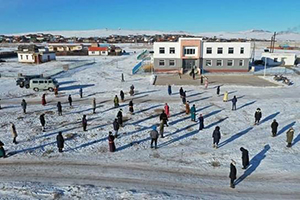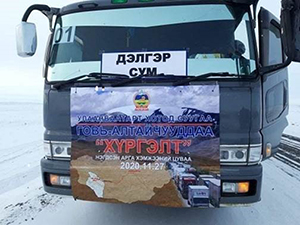Pastoralist-to-Pastoralist discussion on Covid-19
Pastoralists from Asia and Africa led a unique international discussion on April 19, 2021. This inspiring event brought together pastoralists from Kyrgyzstan, Kenya, Mongolia and Tanzania to talk about their lives, herding and the impact of the Covid-19 pandemic.
The 'Covid-19 and Pastoralists - International Virtual Forum' was the first effort to foster pastoral debate and engagement across continents, and was organised by Dr Troy Sternberg and Dr Ariell Ahearn and funded by The Research & Public Policy Partnership Scheme, a partnership between the University of Oxford and the UK Civil Service Policy Profession (2009-RPPPS-553).

Pastoralists participated in the Zoom event by mobile phones and computers from gers (yurts), homes, cars and in town where internet signals were available. The lively discussion raised many interesting points with a Kyrgyz herder commenting 'we are not different from herders from Africa and Mongolia'.
Hosting an event on Zoom was a new experience, but the organisers faced the added challenge of juggling different time zones across four continents (Africa, Asia, Europe, North America), and dealing with multiple languages via translators. Despite the technological challenges, the event featured breakout sessions and lively discussions.
As it was evening in Mongolia the herders were dressed in traditional 'del' outfits whilst the Africans, one dressed in Maasai ceremonial attire, were in the midst of daily activity. That they all took time from their day to engage and discuss their lives to pastoralists and interested observers was impressive.
Many of the impacts of the pandemic were common to all communities: impacts on work and livelihoods, children's education, restrictions on movement and travel and the need for government support so the countryside was not forgotten. The Kenyans and Tanzanians stressed how the loss of tourism severely affected their income; the Kyrgyz and Mongolians spoke about the difficulty selling products (meat, milk, cashmere). All agreed that with schools closed their children's education was suffering and that food prices were increasing. Regular medical check-ups had been cancelled.

There were comments about a lack of Covid-19 information, its spread, and how communities learned about the pandemic. Government restrictions ended cross-border livestock sales (Kenya-Tanzania), closed markets and stopped trade (all); there was 'nothing good from Covid-19'. The Kyrgyz spoke clearly about how the government needed to better prepare (food, masks, medicine) for a future Covid-19 crisis. Positively, the Africans had learned to not depend on one thing for income (tourism) and to 'expand our minds'. Mongolians spoke about an increased demand for high quality meat and milk, better prices from urban demand for healthy food and helpful government support payments. Families had more time together as children were home from school, joining in herding work and culture. In places alcohol sales had been restricted (in Mongolia to 'be healthier'). The Kyrgyz, perhaps speaking for all, 'loved freedom' so did not like the restrictions but knew they were necessary. The pandemic positively stressed the value of livestock keeping and the strength of traditional knowledge and practices that could be shared with younger generations.
There was pride in how the pandemic showed the strength of pastoralism and that customary skills were valued. Relying on animal products and traditional medicines enabled herders to avoid cities and Covid-19 outbreaks. The positive messages showed the viability of pastoralism and its strength in minimising risk. The interest and enjoyment of herder-to-herder discussion was inspiring. After millennia of mobile pastoralism, it took the Covid-19 pandemic to bring herders together virtually. Now that the first connections have been made, the herders and audience eagerly await future interaction between global pastoralists.
Pastoralist-to-Pastoralist discussion on Covid-19
Pastoralists from Asia and Africa led a unique international discussion on April 19, 2021. This inspiring event brought together pastoralists from Kyrgyzstan, Kenya, Mongolia and Tanzania to talk about their lives, herding and the impact of the Covid-19 pandemic. The 'Covid-19 and Pastoralists - International Virtual Forum' was the first effort to foster pastoral debate and engagement across continents, and was organised by Drs Troy Sternberg and Ariell Ahearn.





